In general, more Americans say that government regulation of business is harmful than say it is necessary to protect the public. At the same time, when asked about regulations in specific areas, such as food safety and environmental protection, there is broad support for strengthening regulations or keeping current regulations as they are now rather than reducing regulations.
The public also thinks that in many sectors there is too little rather than too much regulation. Pluralities think there is too little regulation of large corporations, banks and financial institutions and the oil and gas industry. But when it comes to small businesses, far more say there is too much rather than too little regulation of small businesses.
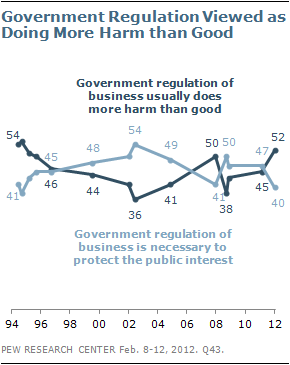
Currently, 52% say government regulation of business usually does more harm than good while 40% think regulating business is necessary to protect the public interest. These views are similar to January 2008, before the financial crisis and onset of the economic recession.
Last March, opinion was more divided; 47% said regulating business is necessary to protect the public interest while 45% said government regulation does more harm than good.
The shift since March 2011 has come mostly among Republicans, widening the gap between the parties on this issue. About three-quarters (76%) of Republicans now say government regulation of business does more harm than good, an increase of 12 points from last year.
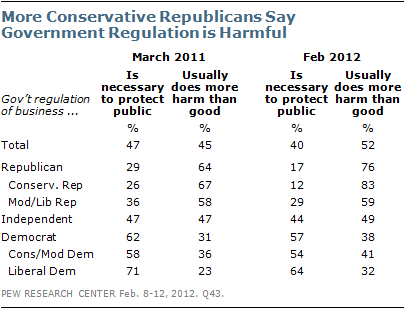
Fully 83% of conservative Republicans say regulation is harmful, up from 67% last year. A majority of moderate and liberal Republicans (59%) continue to say that government regulation of business usually does more harm than good, little changed from March 2011.
There also has been virtually no change among Democrats or independents on general views of regulation. A majority of Democrats (57%) think government regulation of business is necessary to protect the public interest. Independents continue to be divided; 44% say regulating business is necessary to protect the public while 49% believe it usually does more harm than good.
Views of Specific Regulations Little Changed from 1995
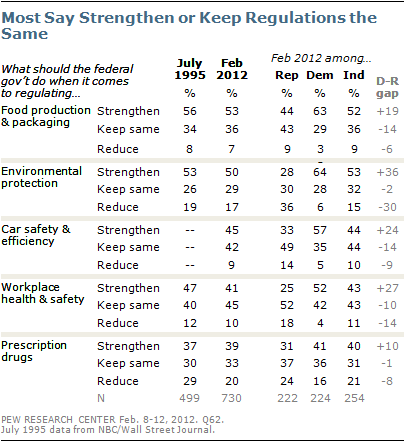
Overall, the public overwhelmingly supports strengthening regulations or keeping them as they are in specific areas, such as food safety and environmental protection; very few want to reduce regulations in these areas. And these views of regulation have changed little from July 1995.
A 53% majority says that the federal government should strengthen regulations of food production and packaging, while 36% say they should be kept the same as they are now; just 7% say regulations in this area should be reduced.
Similarly, half say that environmental protection regulations should be strengthened while 29% think they should stay the same and 17% say they should be reduced. Fewer than half (45%) think safety and efficiency standards for automobiles should be strengthened, while nearly as many say they should stay the same (42%).
About four-in-ten (41%) say workplace health and safety regulations should be strengthened; 45% say they should be kept the same. When asked about prescription drugs, 39% think regulations in this area should be strengthened while 33% think they should stay the same.
There are substantial partisan differences in views of regulation, but the gaps have not widened since 1995. In general, Democrats and independents are more likely than Republicans to support strengthening regulations. Majorities of Democrats (63%) and independents (53%) think that the federal government should strengthen environmental regulations, compared with just 28% of Republicans. Similarly, 57% of Democrats and 44% of independents favor strengthening workplace health and safety regulations. Just 25% of Republicans agree. But even among Republicans, far more say regulations in these areas should be strengthened or kept as they are than say they should be reduced.
Women also are more supportive of strengthening regulations than men. About six-in-ten women (61%) say the federal government should strengthen food safety regulations, compared with 45% 0f men. And by a 47% to 34% margin more women also support stronger regulations of workplace health and safety. There also is a 9-point gap between men and women on strengthening environmental protection and prescription drugs.
Small Businesses Seen as Over-Regulated
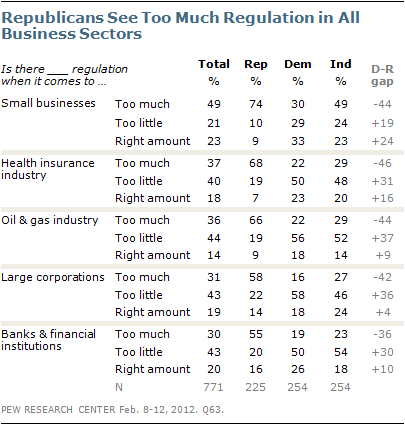
Overall, the public is more likely to say there is too little rather than too much regulation in most business sectors.
About four-in-ten (43%) say there is too little regulation of large corporations, 19% say there is the right amount and 31% say there is too much regulation.
Opinion is nearly identical for banks and financial institution, with a 43% plurality saying there is too little regulation. By a 44% to 36% margin more also say there is too little rather than too much regulation of the oil and gas industry.
Opinion is more divided on the health insurance industry (40% too little; 37% too much). And when it comes to small businesses, a plurality (49%) says there is too much regulation; 23% think there is the right amount and just 21% say there is too little regulation.
Republicans are far more likely than Democrats and independents to say there is too much regulation of many specific groups. Majorities of Republicans say each of the industry sectors tested are over-regulated – from 74% who say there is too much regulation of small businesses to 58% and 55%, respectively, who say there is too much regulation of banks and large corporations.
By contrast, half or more Democrats say each of the sectors is under-regulated, except for small businesses; just 29% say there is too little regulation of small businesses. Independents’ views are close to those of Democrats, again with the exception of opinions about regulation of small businesses. Nearly half of independents (49%) say there too much regulation of small businesses.
Internet Privacy and Government Regulation
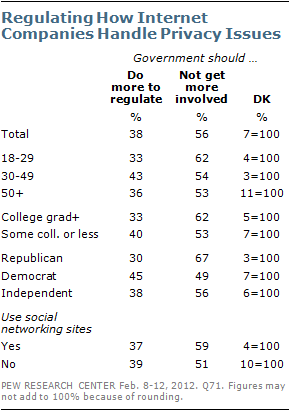
Most Americans (59%) see the business practice of targeting ads based on data collected from users of email, search or social networking sites as an unjustified use of private information. Only one-in-three (33%) see this as a fair exchange for the free services these companies provide.
Despite this concern, Americans are not eager for the government to take a larger role on this issue. A majority (56%) say that the government should not get more involved in regulating how internet companies handle privacy issues, while just 38% say the government should do more. People under age 30 are evenly split on the legitimacy of internet companies using personal information to target ads: 47% call it an invasion of privacy while 46% see it as a fair exchange for free services. By contrast, people over age 30 see this as an unjustified use of private information, by a 62% to 30% margin. In keeping with this, younger Americans are more likely than those age 30 and older to say the government should not get more involved in this issue (62% vs. 54%).
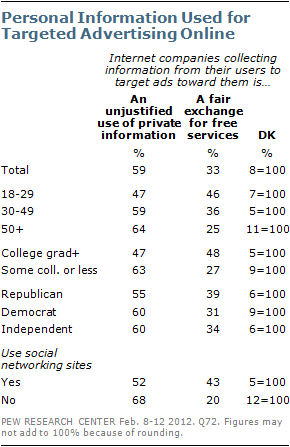
There is also a substantial educational difference in how people view internet privacy. College graduates are more accepting than those without college degrees of the use of personal information by internet companies for advertising, and are more opposed to government regulation.
There is relatively little partisan divide over the legitimacy of how companies use personal information; majorities of Republicans (55%), Democrats (60%) and independents (60%) alike think targeted advertising is an unjustified use of peoples’ private information. But there is a sharp partisan difference over the role the government should take. Two-thirds of Republicans (67%) and a majority of independents (56%) say that the government should not get more involved in this issue. Democrats are evenly divided (45% government should do more vs. 49% should not get more involved).
People who use social networking tools such as Facebook and Twitter are far more likely than those who do not use them to say that collecting personal information for targeted advertising is a fair exchange for services (43% vs. 20%). Yet even among social network users, roughly half (52%) say collecting personal information to target advertisements is an unjustified use of private information. Social network users are more opposed to greater government regulation in this area (59%) than are those who do not use social networking sites (51%).
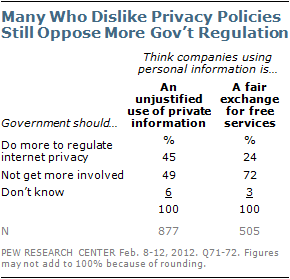
Even among those who are uncomfortable with companies using personal information to target ads, there is no call for greater government regulation. Only about half (45%) of those who think this is an unjustified use of people’s private information say the government should to more to regulate internet privacy, while about the same number (49%) say it should not get more involved. Not surprisingly, among the minority who see the use of personal information as a fair exchange for the free services internet companies provide, 72% oppose any greater government role.




